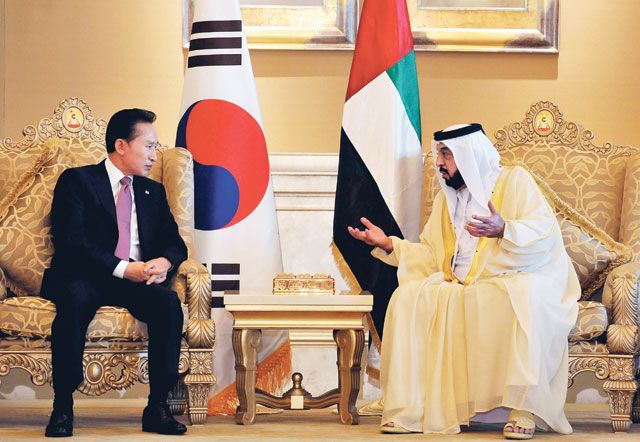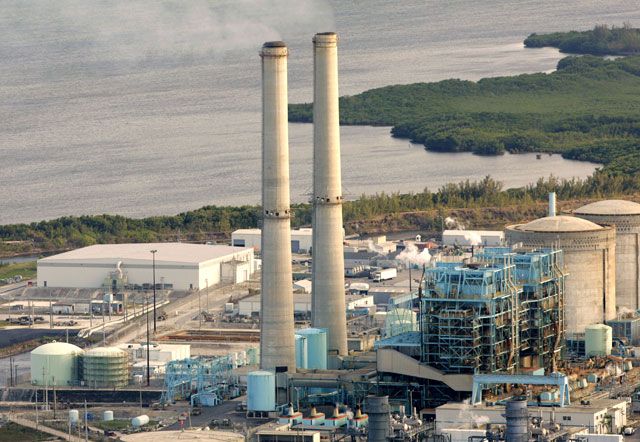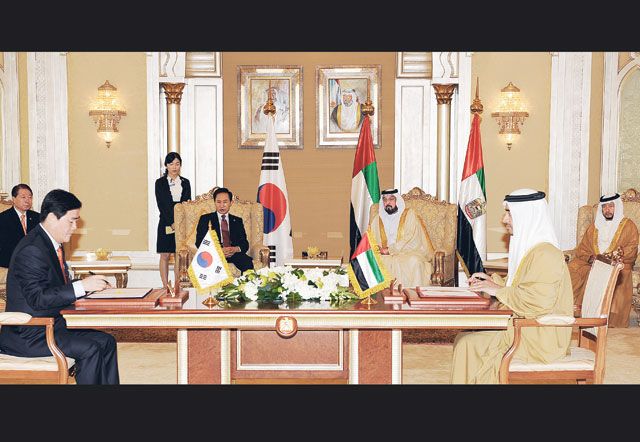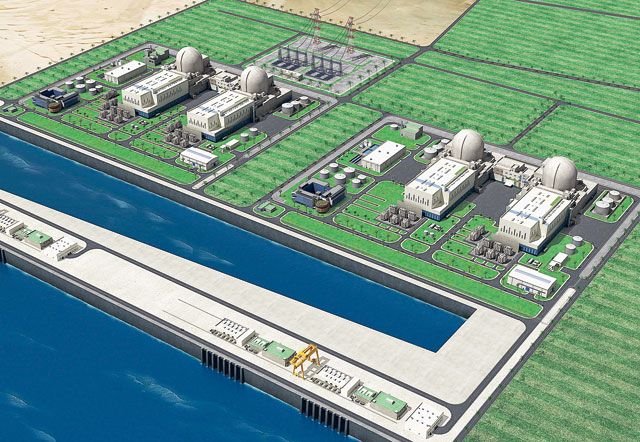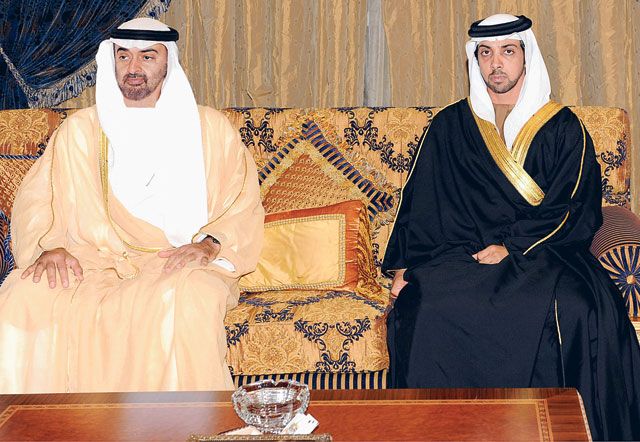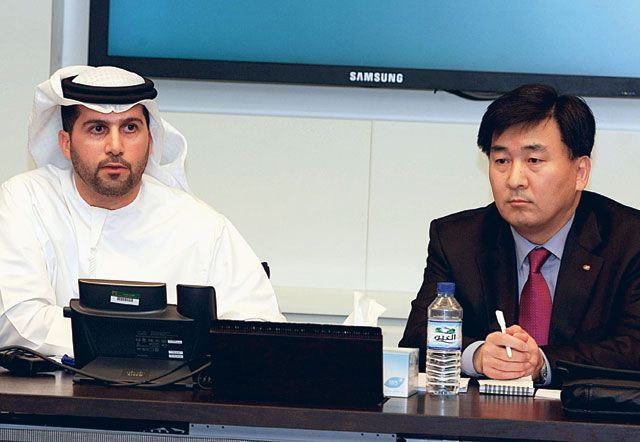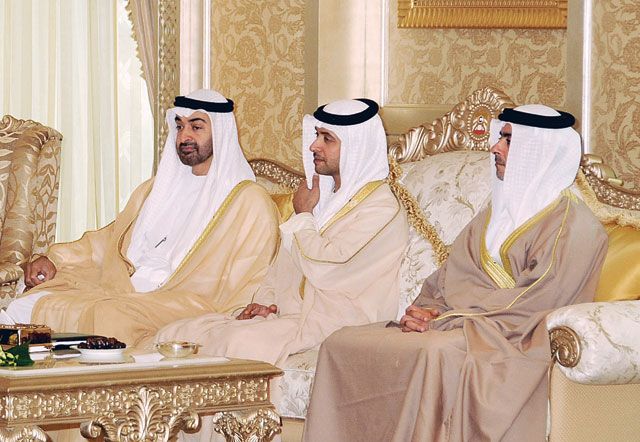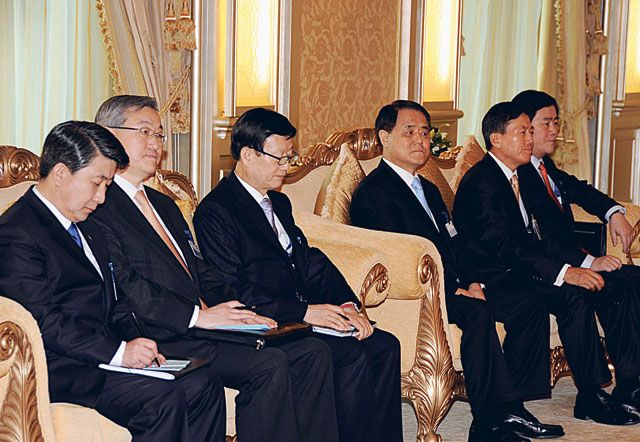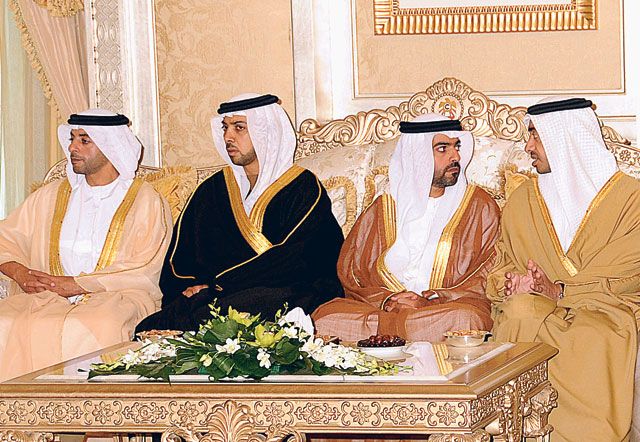Abu Dhabi: A South Korean consortium won a Dh75 billion ($20.4 billion) contract to build nuclear reactors in the UAE, beating more favoured American and French companies for one of the Middle East's biggest energy deals.
President His Highness Shaikh Khalifa Bin Zayed Al Nahyan and South Korean President Lee Myung-bak attended the signing of a series of landmark cooperation agreements, WAM reported.
The agreements, signed by Foreign Minister Shaikh Abdullah Bin Zayed Al Nahyan and South Korean Minister of Knowledge Economy Choi Kyung-hwan, cover a framework protocol to boost economic partnership to strengthen cooperation in a number of areas, including the development of peaceful nuclear energy.
Shaikh Abdullah said: "As negotiations between the UAE and South Korea on peaceful nuclear energy advanced, the two governments discovered the huge potential for joint cooperation in various fields."
Under the nuclear contract, the group led by Korea Electric Power Corporation (Kepco) will design, build and help operate four 1,400-megawatt civilian nuclear power units, a statement by Emirates Nuclear Energy Corporation (Enec) said.
"Enec has determined that the Kepco team is best equipped to fulfil the government's partnership requirements in this ambitious programme," Enec Chairman Khaldoon Al Mubarak said in a statement.
Mohammad Al Hammadi, Chief Executive of Enec, said ten locations for the plants have been proposed.
Al Hammadi said Emiratis will make up 60 per cent of the estimated 2,200 professionals overseeing operation of the plants. The plants are expected to provide 25 per cent of the country's power needs by 2020.
Key points
- The winning consortium includes Korea Electric Power Corp, Hyundai Engineering and Construction, Samsung C&T Corp and Doosan Heavy Industries.
- The award is the largest-ever energy contract in the Middle East and one of the world's biggest nuclear power plant contracts.
- The first of the four units is scheduled to begin providing electricity to the grid in 2017, with the three later units being completed by 2020.
"Following a comprehensive and detailed review of three excellent bids from some of the world's top nuclear suppliers, operators and construction firms, Enec has determined that the Kepco team is best equipped to fulfill the government's partnership requirements in this ambitious program," said Khaldoon Al Mubarak, Chairman of Enec. "The nature of this project will require a partnership that endures for nearly 100 years.
This arrangement has driven us to focus on a very careful assessment of what characteristics among the competing consortia would translate into the best over-all fit in a partner for our program."
Enec Chief Executive Officer Mohamed Al Hammadi, further explained the decision, saying: "We were impressed with the Kepco team's world-class safety performance, and its demonstrated ability to meet the UAE program goals. Additionally, Kepco dedicated a highly experienced team to our project and has shown a serious commitment to transferring the knowledge gained from Korea's 30 years of successful nuclear industry operation into the UAE program. "
Read UAE government document on nuclear policy
"We look forward to a long and productive relationship as we work toward powering the future growth of the UAE with low-carbon, peaceful nuclear energy," Al Hammadi said.
The contract calls for the Kepco team to design, build and help operate four 1,400-MW civil nuclear power units. The value of the contract for the construction, commissioning and fuel loads for four units equaled approximately US$20 billion, with a high percentage of the contract being offered under a fixed-price arrangement.
In addition to the delivery of the four plants, Enec and Kepco have also agreed to key terms under which Korean investors will have an equity interest in the project. This arrangement will further strengthen the business relationship and powerfully incentivize the partners to ensure that the necessary experience, technology and skills are available to achieve on-time and on-budget delivery and safe and reliable operation of the plants.
The contract contains provisions that lower risk to the project and allow the UAE to model its nuclear industry on that developed by Korea during the past three decades.
The first of the four units is scheduled to begin providing electricity to the grid in 2017, with the three later units being completed by 2020.
Given the growth in electricity demand projected for the United Arab Emirates, it is expected that additional units beyond the original four will be procured in the future as the UAE expands its fleet of civil nuclear power plants.
The contract also calls for extensive training, human resource development, and education programs as the UAE builds the capacity to eventually staff the vast majority of the nuclear energy program with national talent, and develops the industrial infrastructure and commercial businesses to serve a thriving nuclear energy industry. Additionally, Enec and Kepco have agreed to work together on business ventures in the utility and energy fields outside the boundaries of the UAE project.
"We are extremely pleased to be selected by Enec as its partner in the United Arab Emirates civil nuclear power program and it will be our top priority to devote our resources and efforts towards the successful delivery of the world's safest, most reliable and cost-efficient nuclear power plants," said Mr. Ssang Su, Kim, President and CEO of Kepco.
"We are fully committed to Enec's goal of providing electricity to the UAE using safe and peaceful nuclear energy, and we have begun mobilizing a team so that we can begin work immediately," Kim added.
Kim emphasized the far-reaching nature of the commercial partnership, noting that the plant to be commissioned in 2017 will remain in operation until at least 2077.
"Kepco will also provide the UAE with its accumulated know-how and experience in developing nuclear power plants, and the Korean government will provide its full support in various aspects of the program to encourage further exchange and collaboration between our two countries," he said.
While welcoming the new partnership with the Kepco-led consortium, Enec officials were quick to point out that discussions continue with the other bidders with regard to potential cooperation in areas outside the scope of the Prime Contract, like long-term fuel supply, joint investments, training and education, among others.
About Kepco
Kepco, a government owned-utility, is the world's third largest nuclear energy business with an installed nuclear generation capacity of 17,716MW as of the end of 2008. Kepco operates 20 commercial nuclear power units as of 2009, with eight more units currently under construction and an additional 10 units planned to be built by 2030.
Kepco is also recognized as a world leader in safety, and plant reliability and efficiency, as assessed by the World Association of Nuclear Operators (Wano), the international organization established to maximize the safety and reliability of the operation of nuclear power plants.
Kepco currently receives among the highest scores in the Wano Performance Indicator program, which quantifies performance standards for nuclear operators around the world.
Importantly, Kepco has also developed a strong record for constructing nuclear power plants that meet stringent industry quality standards and are delivered on time and on budget.
Kepco will supply the full scope of works and services for the UAE Civil Nuclear Power Program including engineering, procurement, construction, nuclear fuel and operations and maintenance support with the assistance of other Korean members of the Kepco team, including Samsung, Hyundai, Doosan Heavy Industries and Kepco subsidiaries:
- Korea Hydro and Nuclear Power Co., Ltd. (KHNP), which will play a key role as the Engineering, Procurement and Construction (EPC) contractor and operator
- Korea Power Engineering Co., Inc. (Kopec), which will provide the nuclear power plant design and engineering service
- Korea Nuclear Fuel Co., Ltd. (KNF), which will provide the nuclear fuel
- Korea Plant Service and Engineering Co., Ltd. (KPS), which will be involved in plant maintenance
Non-Korean companies involved in the KEPCO team include Westinghouse of the US, and Toshiba of Japan.
The Technology
Enec has decided to build Kepco's APR1400, a Generation III, 1400 Megawatt nuclear power plant with evolutionary improvements in safety, performance, and environmental impact that meets the highest international standards for safety and performance.
The APR1400 design was developed by the Korean nuclear industry under the leadership of Kepco over a period of 10 years beginning 1992. A certificate for the standard design approval was issued for the APR1400 by the Korean regulatory authority in 2002.
The APR1400 is similar to, but represents an improvement over, the System 80+ design which was previously certified by the Nuclear Regulatory Commission (NRC) in the United States.
The first of the APR1400 units, Shin-Kori units 3&4, are now under construction, having obtained a Construction Permit from the Korean regulatory authority. Shin-Kori unit 3 will be connected to Korea's grid by 2013.
The first UAE nuclear power plant will be the fifth unit of the APR1400 plants in the world, and Shin-Kori plants will serve as the "reference plants" for the UAE program. As such, Kepco will construct plants that are essentially the same as the "reference plants," but supplemented with changes required to adapt to UAE climactic conditions and any specific requirements of the UAE nuclear safety regulator, the Federal Authority for Nuclear Regulation (FANR).
Enhanced Safety
As a Generation III reactor, the APR1400 has been designed to meet heightened safety goals developed in accordance with the latest international safety standards, which aim to secure an additional margin of safety to protect the public health. The APR1400 design incorporates more than 30 years of operational learning and resulting enhancements to safety, reliability and efficiency.
The APR1400 safety system is designed to prevent or mitigate severe accidents by ensuring reactor shutdown, removing decay heat, maintaining the integrity of the containment facility, and preventing radioactive releases. It is designed to meet the procedural requirements and criteria of the US NRC regulations, including the post Three Mile Island (TMI) accident requirements for new plants.
In addition, the building and structures in the UAE plants will be designed to fulfill the latest requirements for earthquake safety and aircraft impact resistance.
By deploying only a third-generation design, the UAE's future fleet of nuclear reactors will boast safety levels significantly above those of existing nuclear fleets that are still dominated by second-generation designs.
Enec evaluation process
Enec's year-long prime contractor selection process was designed to identify the best long-term partner for the UAE as it undertakes its civil nuclear energy program. The process was guided by the Policy of the United Arab Emirates on the Evaluation and Potential Development of Peaceful Nuclear Energy, which set strict standards for safety and security, non proliferation and sustainability.
Specifically, Enec focused on five core criteria in reaching its final decision.
- Safety – All three teams involved in the Prime Contractor Selection process demonstrated that their technology and safety programs fully met the latest international standards and that their operational safety performance was among the world's highest.
- Having all met that most important criterion, the three teams were further evaluated against the remaining criteria:
- Deliverability – A demonstrated ability to meet the Enec program goals and to begin delivering electricity to the UAE power grid in 2017.
- Contract Compliance – Conformance with Enec's proposed "prime contractor" business structure, which was designed to ensure that accountability for project deliverables would rest with a single prime contractor entity, while appropriately minimizing the contractor integration and management burden on Enec.
- Human Resource Development – A commitment to, and detailed planning for, human resource development in the UAE in support of the development of a sustainable, domestically sourced nuclear energy workforce that is dominated by competent national talent.
- Commercial Competitiveness – A commercial proposal that promoted UAE economic competitiveness via the provision of low-cost electricity and via the establishment of partnering opportunities to accelerate the development of the UAE nuclear industry, as well as appropriately assigned risk reflecting the long-term nature of the commercial and operational relationship contemplated within the draft prime contract.
A team of 75 dedicated experts evaluated the bids during the last year. Collectively, the team boasted more than 900 years of directly relevant experience in the nuclear industry. The team was made up of experts in the following fields: nuclear power plant safety, design and construction; operations and maintenance; nuclear quality assurance, supply chain management and procurement; nuclear fuel procurement and management (including safeguards, non proliferation and spent fuel management); siting analysis (including environmental impact assessment, seismology, geology, meteorology and hydrology); finance (including generation cost modeling and project finance); legal and contracting; program management; utility operations; and communications and community relations.
Kepco is expected to begin mobilizing its team in Abu Dhabi immediately. Hee Yong Lee, one of Kepco's most senior executives, will lead the UAE project. A trained nuclear engineer, Mr. Lee has worked for Kepco's for more than 30 years in the fields of construction management, quality assurance, long-term power planning, as well as in training, commissioning and operations at nuclear power plants.
Enec is currently in the advanced stages of evaluating a number of potential sites for nuclear power plants throughout all regions of the UAE. A team of UAE and international experts is conducting detailed scientific studies on seismology, geology, environment impact and other factors related to siting. That study and others will contribute to the final decision on where to build the units.
Program Background
Energy Demand
The Government of Abu Dhabi established Enec following an evaluation of the UAE's future energy needs that determined the country would need to substantially increase its generating capacity to meet expected electricity demand.
The UAE's evaluation of its energy needs was wide-ranging and resulted in the following findings:
- That volumes of natural gas that could be made available to the nation's electricity sector would be insufficient to meet future demand.
- That the burning of liquids (crude oil and/or diesel) would be logistically viable but both costly and environmentally harmful.
- That coal-fired power generation while potentially cheaper, would be environmentally unacceptable, and potentially vulnerable from a security of supply standpoint.
- And finally, that the deployment of renewable and other alternative energy supplies, while desirable, would only be able to supply approximately 6-7% of the required electricity generation capacity by 2020.
- Four factors supported the decision to begin the program:
- Economics – Well run nuclear energy plants are among the most efficient producers of electricity.
- Security of fuel supply – Nuclear power plants have high availability factors (in excess of 90 %) and can operate for 18-24 months on a single fuel load.
- Environment – Nuclear plants emit no greenhouse gases and represent an important tool for combating climate change.
- Industrial Development – A sustainable nuclear energy program will create new service industries and high-value jobs, while enhancing economic development throughout the UAE.
- Human Resource Development – Essential to the Program and the Nation
Central to the UAE's approach to developing a nuclear energy program has been the importance of building a qualified workforce in the short and long term.
Enec has joined with the Khalifa University of Science, Technology and Research, the Institute of Applied Technology, the Federal Authority for Nuclear Regulation, other parts of the UAE educational system, as well as universities internationally to ensure that there will be a reservoir of talent, both Emirati and expatriate, well into the future.
Current estimates are that the program will need between 2,100 and 2,300 staff by 2020. Enec is committed to ensuring that talented Emirati women and men play a major role in the program – occupying positions of authority and responsibility in all aspects of the nuclear energy industry.
Nuclear Fuel – Strategies under development
Enec is in the process of developing and implementing a strategy for the management of all nuclear fuel cycle activities including the procurement, use, and short- and long-term management of nuclear fuel for its nuclear power plants.
The strategy conforms to guidelines established by the International Atomic Energy Agency and will be continually updated, taking into account new information and technological advances from the nuclear industry during the next decades, before the long-term spent fuel management plan is implemented.
The UAE policy on nuclear energy
The UAE's comprehensive approach to nuclear energy is detailed in the Policy of the United Arab Emirates on the Evaluation and Potential Development of Peaceful Nuclear Energy, a document released in April 2008.
One of the main pillars of the policy is the decision to develop the program with safety and non-proliferation as its foundation, and to forgo domestic enrichment and reprocessing of nuclear fuel, the two parts of the nuclear fuel cycle that can most readily be used for non-peaceful purposes.
This policy establishes a new model through which non-nuclear states may explore and potentially deploy nuclear energy with the full support and confidence of the international community. International observers and non-proliferation experts have called the UAE model the "gold standard" for developing a nuclear energy program.
The UAE has now signed or is in the process of signing agreements for cooperation in the field of peaceful nuclear energy with numerous countries, including the France, Korea, the United States and others.


